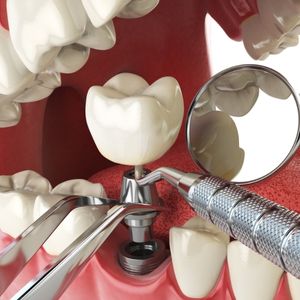
Dental Implant Surgery
For many years, the only treatment options available for people with missing teeth were bridges and dentures. But today, dental implants are available. Implants provide a strong foundation for fixed (permanent) or removable replacement teeth that are made to match your natural teeth. Implants are replacement tooth roots.
In most cases, anyone healthy enough to undergo routine dental extraction or oral surgery can be considered for dental implants. Patients should have healthy gums and enough bone to hold the implant. They also must be committed to good oral hygiene and regular dental visits.
If you want to know more about Dental Implant Surgery, book an appointment at My Dental Care today.
Advantages of Dental Implant Surgery
There are many advantages to dental implants, including the following:
- Dental implants look and feel like your own teeth. And because they are designed to fuse with bone, they become permanent.
- Improved speech. With poorly-fitting dentures, teeth can slip within the mouth, causing you to mumble or slur your words. Dental implants allow you to speak without the worry that teeth might slip.
- Improved comfort. Because they become part of you, implants eliminate the discomfort of removable dentures.
- Easier eating. Sliding dentures can make chewing difficult. Dental implants function like your own teeth, allowing you to eat your favourite foods with confidence and without pain.
- Improved self-esteem. Dental implants can give you back your smile and help you feel better about yourself.
- Improved oral health. Dental implants don’t require reducing other teeth, as a tooth-supported bridge does. Because nearby teeth are not altered to support the implant, more of your own teeth are left intact, improving long-term oral health. Individual implants also allow easier access between teeth, improving oral hygiene.
- Implants are very durable and will last many years. With
- good care, many implants last a lifetime.
- Removable dentures are just that - removable. Dental implants eliminate the embarrassing inconvenience of removing dentures, as well as the need for messy adhesives to keep them in place.

If you are worried about your teeth and want to know more about Dental Implants, make an appointment with Jaipur’s best dentist, Dr Savina Gupta, at My Dental Care.
Surgery
The tooth root implant, which is a small post made of titanium, is placed into the bone socket of the missing tooth. As the jawbone heals, it grows around the implanted metal post, anchoring it securely in the jaw. The healing process can take from six to 12 weeks. Once the implant has bonded to the jawbone, a small connector post - called an abutment - is attached to the post to securely hold the new tooth. To make a new tooth or teeth, your dentist makes impressions of your teeth and creates a model of your bite (which captures all of your teeth, their type, and arrangement). The new tooth or teeth are based on this model. A replacement tooth, called a crown, is then attached to the abutment.
The Risk of Dental Implants

Success rates of dental implants vary, depending on where in the jaw the implants are placed. Heavy smokers, people suffering from uncontrolled chronic disorders -- such as diabetes or heart disease -- or patients who have had radiation therapy to the head/neck area need to be evaluated on an individual basis. These patients may encounter failure of implant therapy. Associated risks with dental implant therapy are-
- Sinus damage: One major dental implant risk is sinus damage. Sinuses are located just above the upper jaw. Implants to replace the upper teeth can potentially penetrate into the sinus, leading to discomfort or possible infection. If this happens, it can be managed by sinus lavage and medications.
- Infection: Like any other surgery, dental implant surgery has a risk of infection too. The patient is always instructed to keep the surgical area clean with proper brushing & rinsing of the mouth. Yet the infection happens in the surgical site, and it can be controlled with medications and oral hygiene maintenance.
- Nerve damage: It’s possible for implant surgery to lead to damage to oral nerves close by. It can be avoided by proper planning pre-operatively with x-rays.
Before you commit to dental implants, all the risks should be discussed pre-operatively. Then only a decision on the placement of implants should be made. Jaipur’s best dental clinic, My Dental Care, provides you with consultation and the best dental implant surgery.
